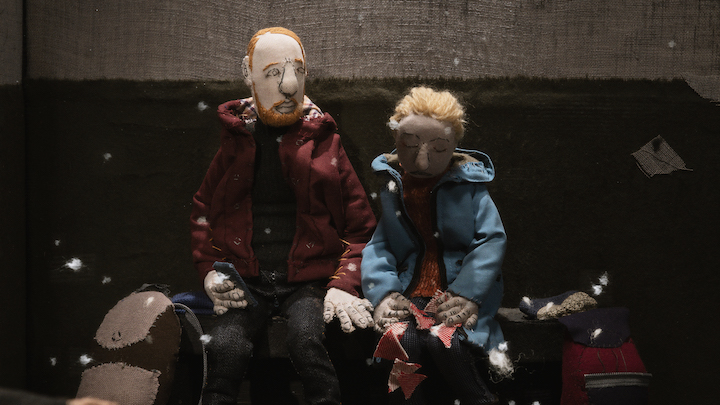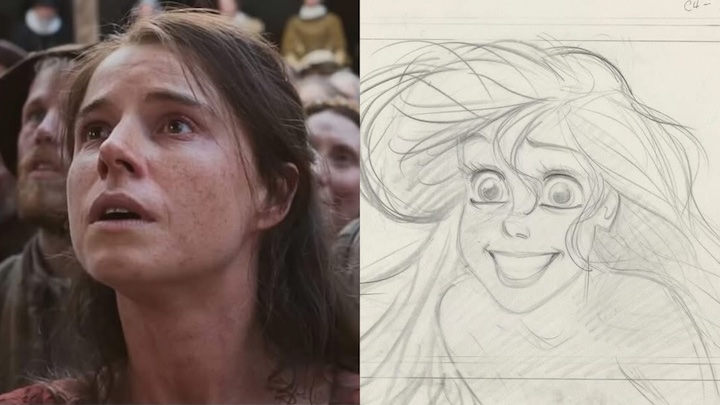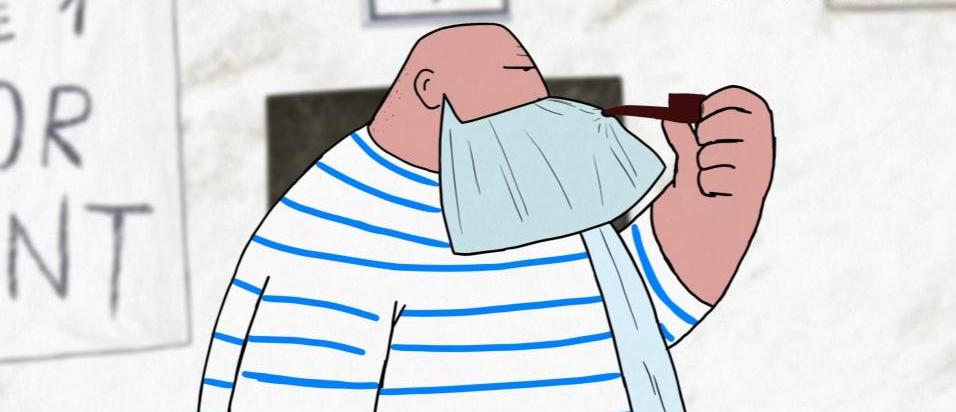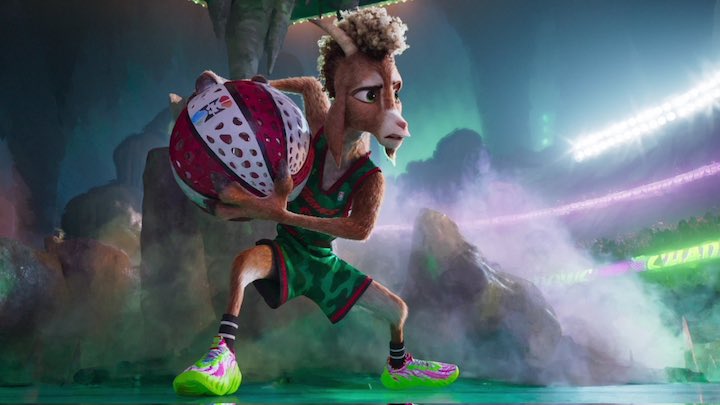A website dedicated to animation, awards, and everything in between.
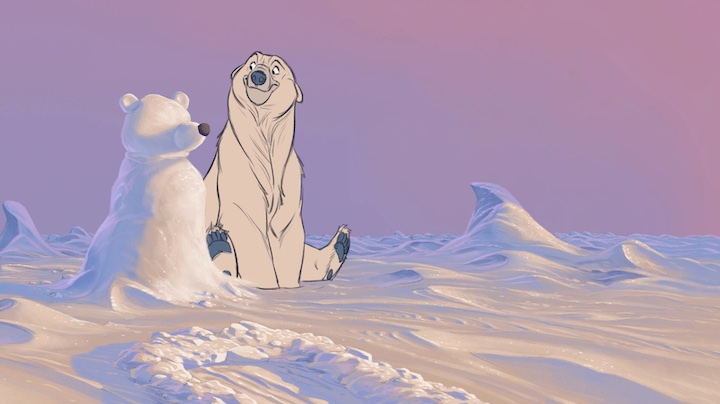
Credit: Snow Bear (Aaron Blaise)
Snow Bear was a labor of love for former Disney animator Aaron Blaise. Over the course of three years, he single-handedly animated the eleven-minute film, which consists of roughly 11,000 drawings. The touching story centers on a lonely polar bear who creates a companion out of snow. As his snowy friend begins to melt, the polar bear seeks colder climates. Blaise previously received an Oscar nomination for co-directing the feature Brother Bear. Snow Bear may bring Blaise back to the Oscars if nominated for Best Animated Short at the 98th ceremony. Cartoon Contender spoke with Blaise about his Disney background, going independent, and how his life came to reflect Snow Bear’s story.
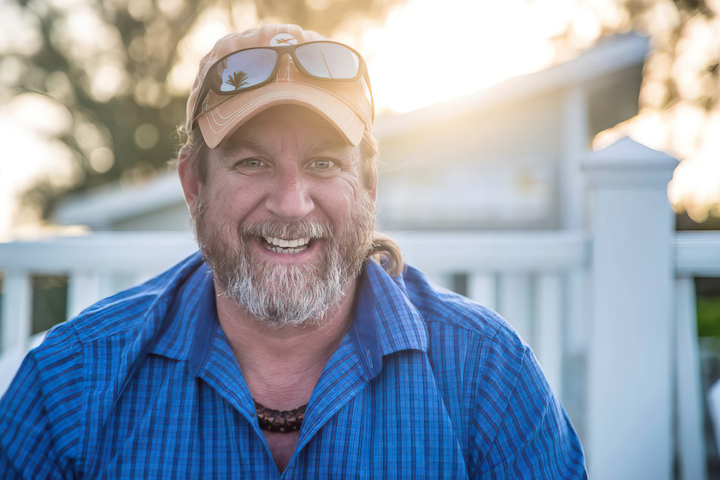
Credit: (Aaron Blaise)
A: You were the sole animator on Snow Bear, which had 11,000 drawings. Did you ever consider bringing another animator on board to help out?
Q: Actually, my goal was to do it all myself. I never considered bringing someone else on. I've always wanted to do my own film, and this was a great opportunity. As a matter of fact, the entire film itself was planned around me doing it on my own. That's why it was only one character, really… well, one main character. We had all these other kinds of ancillary characters, but it was all set up just for me to do on my own right from the beginning.
Q: In addition to bears, you’ve animated many other animals, including Wilbur in The Rescuers Down Under, Rajah in Aladdin, and young Nala in The Lion King. You also worked on the Beast in Beauty and the Beast, although he’s technically human under the fur. What drew you to drawing animals?
A: Even before I was an animator, I loved drawing animals. I've always been fascinated by them, I empathize with them… As I grew up, I wanted to be a wildlife artist, and when I went to college, I wanted to work for National Geographic as an illustrator. That was my goal. So, I actually didn't train as an animator. I trained as an illustrator with my ultimate goal to work for National Geographic. And it was while I was at art school that my goals kind of shifted when I got the opportunity to intern with Disney back in 1988. I did the internship with them, and I fell in love with animation. So, I took that love of animals and brought it into my new career animating. That’s how I ended up doing what I'm doing now.
Q: You’ve cited Glen Keane as one of your mentors. After Keane left Disney, he started experimenting with shorts like Duet and Dear Basketball, the latter of which won an Oscar. Did Glen’s success inspire you to also get involved in short subjects?
A: To be honest, I pursued short films only because that's all I could get done by myself. I really couldn't do anything longer than that. I mean, already, just to do this ten-and-a-half-minute, eleven-minute film, it took me three years. So, if you do the math, that'd take about… it'd take about thirteen years for me to do a feature, if I did it on my own, with one character… I actually have several feature ideas that I've written treatments for, and I've started to board as well. I just need a crew. I love short subject filmmaking, I love feature length, I love series. As long as I'm animating, I'm happy.
Q: Can you talk about any of the features that you have in mind?
A: I can talk about one, in particular, based on Snow Bear. I fell in love with the character, I fell in love with that world. And because it's just a short, I would love to expand it… I've written a prequel to Snow Bear about our polar bear character that's in the film, about him when he was a cub, and kind of his childhood growing up, and this big adventure that he goes on over a period of like three or four years through the course of the story.
Q: Snow Bear doesn’t have an explicitly environmental theme, although it’s hard not to think about the polar ice caps while watching the film. Have you received feedback from any environmentalists?
A: A lot, actually. We teamed up with Polar Bears International and the National Parks Conservation Association… From a story standpoint about loneliness, it's about the longing for companionship. But because it's set in the Arctic about this loamy polar bear, the environmental changes that are happening with the planet right now really do affect the story, and so I couldn't help but have that kind of come in towards the second half of the film… Along with being moved by the story, I'm hoping that it raises a little bit of awareness for kind of what the planet's going through from a planet-warming point of view.
Q: Snow Bear could easily be mistaken for a classic, hand-drawn Disney short. Of course, there is one hilarious moment that Disney probably wouldn’t have signed off on when the polar bear chows down on a seal. The snow bear rejects a bite when offered. What was it like making an independent film with no studio higher-ups giving notes?
A: It was great, but I’m also my worst critic. I also know, just through experience (I was with Disney for twenty-one years), that you can get too close to a film, and not see some of the things that should or need to be fixed or changed. So, I was really diligent about showing the film to friends and fellow colleagues that I trust to give me good opinions… Even through the course of making the film, I was constantly refining it.
And it's funny, the gag that you mentioned about the seal, I went back and forth on that, but ultimately, I decided, “Hey, this is a polar bear. This is what polar bears do. Their main food are seals.” And the idea is, if you have a companion, you have friends, you go out to dinner together. That's where the seed of that idea came from. So, I just put the snow bear in the point of view of the audience, where they're just going… he’s going, “oh, no,” you know? He doesn't want to eat. It’s one of the biggest laughs in the film.
Q: I was sorry to learn that you lost your wife to breast cancer in 2007. Making Snow Bear, I heard that you came to personally reflect on its story about searching for companionship. Were you thinking of your wife when you first conceived this project?
A: It evolved into that. I wanted to tell a story about loneliness, and I wanted to tell a story about a polar bear looking for friendship. Whenever I come up with a seed of an idea like that, because I thought that could be interesting, and I think that emotion is universal. Then the next step is, “How do I make it my own?” How do I inject my own experiences into it to make it feel even more believable and more authentic? The more I got into it, the more I related it back to my own experiences from finding companionship, losing that companionship, and the emotional torment of that to finding love again. All of that, it really became a metaphor for the last twenty years of my life… but it really, to your question, that seed was literally… I want to do an animal, and I want it to be a single animal living a lonely existence, and the first thing that popped in my head were polar bears in the Arctic. So, that's how I started with it.
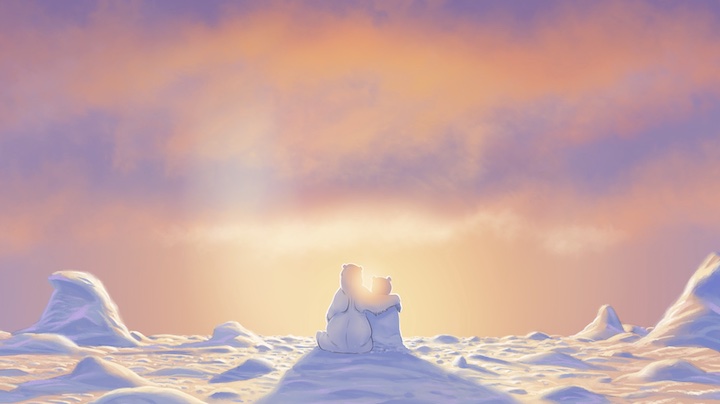
Credit: Snow Bear (Aaron Blaise)
Q: Snow Bear has already won several awards. What has it been like taking the film on the festival circuit?
A: Busy. It's been very, very busy. I'm extremely happy that it's been received so well. When you work on something for so long, and you pour your heart into it… film is meant to be seen by the masses. That's what I ultimately want to happen. You get nervous. You want the audience to like it. Now that it's out, and we're getting the response that we are, that makes me very happy. I can breathe a little bit, but it has been pretty exhausting, kind of bopping around the world. hitting some of these different festivals.
Q: Snow Bear has qualified for Oscar consideration. If Snow Bear gets nominated, it won’t be your first trip to the Oscars. Over twenty years ago, you and Robert Walker got into Best Animated Feature for Brother Bear, which was nominated against Finding Nemo and The Triplets of Belleville. What are your recollections of that Oscar night?
A: It was an amazing night, going to the Oscars. I'm not all about the awards. It'd be nice to get an Oscar, because that really helps give us momentum to create more films and bring revenue to us in order to do features, and that sort of thing. But I gotta say, going to the Oscars is probably one of the coolest events I've ever gone to, and it's enough to make you want to go again. That being said, you know, Snow Bear has had a really great run. I'm really happy with how it's done, and it's gotten some really great awareness out there. If it gets nominated, then that would be amazing. And that night, for Brother Bear, we really had a great time because the nominees are all on one level. Then everyone else sits above you. So, when you're down on that floor with all the other nominees, you're brushing elbows with a lot of pretty big-name people, and it’s a lot of fun.
Q: Speaking of awards, you received the Winsor McCay Award from ASIFA-Hollywood earlier this year. What was it like getting that honor?
A: I was completely taken by surprise, for sure. I'm fifty-seven now, but I only feel like I've just started. I really do. I know I've been in it for a long time, but when I kind of reflect on my career, there's so many more things that I want to do, and so to get a Lifetime Achievement Award, I feel like, no, wait, wait, I haven't done it all yet! I feel like there's so much more to do, but it was an incredible honor… There's so many other people out there, and I know this sounds like a canned answer, but there really are so many people out there that deserve it more than me. Having gotten it, I feel like I really want to live up to the prestige of that award, because it really does mean a lot.
Q: Having animated grizzly bears and polar bears, which do you prefer?
A: Oh, I don't prefer either one. They both are a lot of fun. They're both completely different, actually. There's some similarities as well. Polar bears are fun because they're classified as a marine mammal. They're just as comfortable in the water as they are on land, walking across the ice, or the ice pack, or across the ground. I loved animating him swimming and interacting with the whales and all that, so I do have to say there's a lot of fun there. But I don't know, they’re both a lot of fun to do. I think I need to get away from bears for a little bit and go… you know, animate some other animals is what I need to do.
I proceeded to suggest that Aaron make a film about koala bears, which technically aren’t bears.
Nick Spake is the Author of Bright & Shiny: A History of Animation at Award Shows Volumes 1 and 2. Available Now!
